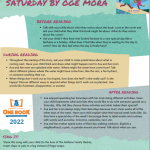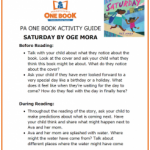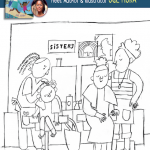The Pennsylvania One Book initiative is a valuable program that highlights the importance of early literacy development in preschoolers and the significance of reading early and often to children, as well as engaging them in conversation and other activities around books. The program has remained successful in part due to the partnership of collaborating agencies that all support early childhood literacy efforts.
PA One Book Activities for Saturday
BEFORE READING:

Talk with your child about what they notice about the book. Look at the cover and ask your child what they think this book might be about. What do they notice about the cover?

Ask your child if they have ever looked forward to a very special day like a birthday or a holiday? What does it feel like when they’re waiting for the day to come? How do they feel when the day is finally here?

Share this song with your child (to the tune of The Addams Family theme). You can insert claps or pats to a leg instead of finger snaps.
Days of the week (snap, snap)
Days of the week (snap, snap)
Days of the week, days of the week, days of the week (snap, snap).
There’s Sunday and there’s Monday,
There’s Tuesday and there’s Wednesday,
There’s Thursday and there’s Friday,
And then there’s Saturday.
Days of the week (snap, snap)
Days of the week (snap, snap)
Days of the week, days of the week, days of the week.
DURING READING:

Ask your child if they have ever looked forward to a very special day like a birthday or a holiday? What does it feel like when they’re waiting for the day to come? How do they feel when the day is finally here?

Ava and her mom are splashed with water. Where might the water have come from? Talk about different places where the water might have come from, like the rain, a fire hydrant, or someone washing their car.

When things don’t work out as Ava hoped, how does she feel? Is she really sad? Is she happy? Discuss different ways to respond when things don’t work out as planned. Use words like frustrated, disappointed, or excited.
AFTER READING:

Ava enjoyed spending her Saturdays with her mom doing different activities. Have your child brainstorm what activities they would like to do with someone special on a Saturday. Why did they choose those activities and what makes it special?

Ava and her mom always enjoy their Saturdays because Ava’s mom works all of the other days of the week. Have your child explain what their typical week looks like. Do they have a special day of the week? Encourage them to label events and routines with words such as today, tomorrow, yesterday, next, etc.

Ava and her mother spend some of their day walking outdoors. Explore a neighborhood, a park, or parade around your home! Talk about what you see.
MAKE IT:

The illustrator, Oge Mora, designed pictures in the book using collage. Collage is a piece of art made by sticking various materials on pieces of paper or backing. Create your own collage using a variety of materials like newspapers, magazines, cut paper, etc. (STANDARD AREA(s): Creative Thinking and Expression – Communicating through the Arts & Health, Wellness, and Physical Development – Learning About My Body)
You and your child can make puppet versions of yourselves. Gather cardboard tubes, markers, yarn, glue, and fabric or paper. Use these materials to create a puppet. Click here to learn more about different types of puppets. (STANDARD AREA(s): Creative Thinking and Expression – Communicating through the Arts & Health, Wellness, and Physical Development – Learning About My Body)
Ava and her mom had their hairdos ruined because a car drove by and splashed them with water. Talk about how water can affect different materials. Use a tissue and add a few drops of water. What happens to the tissue? Other materials to try might include: a washcloth, a feather, a piece of paper, or even a piece of cereal. (STANDARD AREA(s): Scientific Thinking and Technology – Exploring, Scientific Inquiry, and Discovery)
Mindfulness Breathing Activity

- Help children to write a letter to or draw a picture for a family or friend, sharing what they think would be the perfect Saturday. Where would they go? Who would they see? What would they do? Sentence starter: On my perfect Saturday, I would___________.
- There are so many wonderful ways to engineer and design crafted puppets. Go on a scavenger hunt around home for parts to use.
- There are many different types of puppets. Which of these can be made with children?
- A marionette can be engineered using beads, string, popsicle sticks and fabric. The puppets work using gravity.
- Shadow puppets can be made by cutting out the silhouette of the shape of the puppet using dark paper.
- Rod or stick puppets can be designed by gluing or taping the shape onto a stick found outside, or a popsicle stick.
- Sock puppets can be made using buttons, scrap fabric, and any other loose part that sparks imagination.
- Paper Bag puppets allow lots of time to engage using scissors and building children’s muscles in their hands to become writers.
- Clothespin Puppets look like they can talk when the hinge opens and closes.
- Design a puppet stage using a cardboard or shoe box, couch cushions, or by stacking blocks.
Additional Activities Aligned to Early Learning Standards
APPROACHES TO LEARNING THROUGH PLAY – CONSTRUCTING, ORGANIZING, AND APPLYING KNOWLEDGE
- Ask children if they can recall all of the things that didn’t go as planned for Ava and her mom. How do they think Ava felt when things didn’t go as planned? Use words like sad, disappointed or excited.
LANGUAGE AND LITERACY DEVELOPMENT – ENGLISH LANGUAGE ARTS
- Practice saying the days of the week with children. What is their favorite day of the week? Why?
- Throughout the reading of the story, have children make predictions about what is coming next. Have the children think about and share what might happen next with Ava and her mom.
- After reading the story, have children retell what happened, including identifying the main characters. Allow children to draw and use illustrations to show understanding of the text. What do they remember about the main idea of the text?
- The book, Saturday by Oge Mora, introduces many different words. Pick a few words from the list below and discuss what the words mean while reading. Encourage children to use these new words when speaking at mealtime or throughout the day, and praise their efforts. The whole family can join in this activity!
- cherish = love and care for
- zip = (in this context) to hurry from excitement
- lounge = relax
- salon = a place where people get their hair styled and their nails painted
- hairdo = a fancy hair style
- picnic = eat a meal outdoors, often in a park
- splendid = beautiful and amazing
- hardly = with difficulty
- cancel = will not happen
- pause = slow down or stop for a moment
- reassure = encourage and help to feel better
- boo-hoo = cry
- ruin = messed up, spoiled, or destroyed
- relief = feeling of calm or rest after being worried or in pain
- chirp = (in this context) to speak quickly and sharply
- crumple = crush or fall
- Ask children why they think Ava and her mom cherish Saturdays. What is so special about Saturday? How do they think Ava and her mom felt when storytime was canceled? Ask children how they would feel. What would you do?
- Ask children how Ava and her mom might feel when they get soaked. Ask children how they would feel if this happened to them. What would they do?
- After a morning like that, ask children what they think Ava and her mom wanted to do when they got to the park. Do they think it would be hard to do in a park that is noisy and crowded?
- Why can’t Ava and her mom go to the puppet show? What happened?
- Ask children if they think Ava and her mother had a good Saturday. Why or why not?
- Discuss with children if they have ever experienced a time when it seemed like everything was terrible, but it was okay in the end.
- Read Aloud Activities Camp Challenge One Page Guide
Extension Activities:
- Retell the story of Ava and her mom’s Saturday using finger puppets. Using index cards, draw, cut out (with the help of an adult), and decorate finger puppets for the characters and items from the story: Mom, Ava, cat, dog, car, butterfly, and Mom’s purse.
- Make a calendar for the month. What activities and events will you do this month?
- Ask children what they think Ava and her mom should do next Saturday? Help plan their day. Use words like first, next, then, and finally.
MATHEMATICAL THINKING AND EXPRESSION – EXPLORING, PROCESSING, AND PROBLEM-SOLVING
- Shapes can be found everywhere! Have children refer to different pages in the book and identify the different shapes that can be found. How many different shapes can they find?
- Ava and her mom had planned to do many different things on Saturday. Ask children what day it is currently, and then ask them how many days until Saturday.
- Encourage children to add a continuation to the story. What happens next? Where might they go? What else might they do?
SCIENTIFIC THINKING AND TECHNOLOGY – EXPLORING, SCIENTIFIC INQUIRY AND DISCOVERY
- In the story Ava and her mom take a trip to the park. There are many living (like trees or flowers) and non-living (like benches or fences) items found in a park. Explore the difference between the two and talk about how plants and animals grow and change.
- Talk about the different seasons. What season might it be in the book? How do we know? Look for clues in the book, like the clothing Ava and her mom are wearing, and the outside activities.
- Talk about what would have happened if the temperature was cold outside. Would Ava and her mom have been splashed with water? Lead children to talk about the changes in matter that can occur based on the weather.
SOCIAL STUDIES THINKING – CONNECTING TO COMMUNITIES
- This story takes place in what looks like an urban setting with large buildings in the background. Help children identify the different types of buildings and local businesses that surround their community.
- Ava’s mom works the other days of the week, except for Saturday. Talk about what other people might be working on Saturday and the jobs they do. Does the person driving the bus work on Saturday? How might you know this?
CREATIVE THINKING AND EXPRESSION – COMMUNICATING THROUGH THE ARTS
- Ava and her mom were going to the theater to watch a puppet show. Have children use their imagination and creativity to create a performance that could be performed at a theater.
- Have children act out and re-create a part of the story. Encourage children to use voice inflections and facial expressions. Have children help and support each other when acting out their parts.
HEALTH, WELLNESS, AND PHYSICAL DEVELOPMENT – LEARNING ABOUT MY BODY
- Ava and her mom begin their Saturday with breakfast. Talk about what foods children eat for breakfast. Have children identify foods that help keep their bodies healthy.
- In the story, Ava and her mom begin their special Saturday with breakfast together. Mealtimes are a great time to talk together and discuss what is planned for the day.
- Get more early learning activities about mealtimes at PA Promise Learning is Everywhere – Learning in the Kitchen.
SOCIAL AND EMOTIONAL DEVELOPMENT – STUDENT INTERPERSONAL SKILLS
- Ask children how they think Ava felt throughout different parts of the book. Do they think she was happy? Do they think she was sad? Why? How did her emotions change from the beginning to the end of the book?
PARTNERSHIPS FOR LEARNING – FAMILIES, EARLY CARE AND EDUCATION PROGRAMS, COMMUNITIES
- Being outdoors has many benefits for children. It invites children to learn science, creates opportunities for social interaction and collaboration, promotes physical health, invites new contexts for learning, promotes better sleep, gives children a chance to take appropriate risks, may lead to better learning outcomes once children return to other activities, supports STEM skills, and anchors children to the real world. (NAEYC) Explore parks and libraries in your community.
- Community Inclusion refers to the opportunities for meaningful interactions between families and children both with and without special needs within the community. Learn about activities and locations that provide opportunities for Community Inclusion for those families of children with and without special needs.
- Saturday was also recognized by the Pennsylvania Center for the Book in 2020 as a Baker’s Dozen Award winner. The Pennsylvania Center for the Book’s A Baker’s Dozen is a nationwide, annual initiative to screen over 2,000 picture books each year with the goal of identifying the top 13 that fulfill the goals of family literacy programs for preschoolers. Find other books that were a Baker’s Dozen Award winner.
For more mindfulness activities, visit www.mindful.org/mindfulness-for-kids
Pennsylvania’s Learning Standards for Early Childhood are research-based according to age and development, and form the foundation for curriculum, assessment, instruction and intervention within early care and education programs. They can help families determine what their child might be learning in an early learning setting. Learn more at www.pakeys.org/pa-early-learning-initiatives/early-learning-standards
This project is made possible in part by Library Services and Technology Act (LSTA) funds from the U.S. Institute of Museum and Library Services and through the Commonwealth of Pennsylvania’s Library Access funds administered by the Pennsylvania Department of Education, Office of Commonwealth Libraries. The views, findings, conclusions, or recommendations expressed in this website do not necessarily represent those of the U.S. Institute of Museum and Library Services or the Pennsylvania Department of Education.
© Copyright 2012 – 2022 Pennsylvania One Book: Every Young Child. All Rights Reserved.


